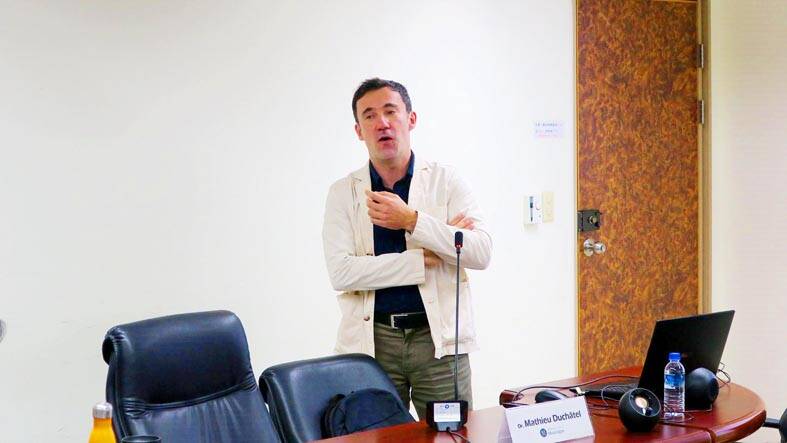A French researcher on Monday said that the US is taking a confrontational stance against China, which would maintain Taiwan’s leverage in negotiating with Washington.
Mathieu Duchatel, Asia Program director at the Paris-based think tank Institut Montaigne, said that while US President Donald Trump occasionally discusses trade with China or regional spheres of influence, the White House’s economic security measures emphasize an oppositional stance on Beijing.
For example, the America First Investment Policy signed last month states that the US would “use all necessary legal instruments,” including the US Committee on Foreign Investment in the US, to restrict China’s investment in strategic sectors, Duchatel said.

Photo: courtesy of National Cheng Chi University’s College of International Affairs
The US government has also showed hostility against China in semiconductors, he added.
While Taiwan’s democratic values are insignificant to Trump’s “America First” policy, it is still important to the international community, Duchatel said.
However, Taiwan still “has cards to deal” when it comes to semiconductors, as the US needs more high-end chips, he said.
A second bargaining chip is Taiwan’s role in the competition between the US and China, as signs indicate that the competition would continue and constitute a main pillar of US foreign policy, he said.
Taiwan can also play a part in defense collaborations against the Chinese People’s Liberation Army, with interests aligned with the US, he added.
“Beijing is avoiding heating up while showing that they have new options to respond, such as strategic export restrictions, to convey that they are preparing for conflict” in the face of tough US trade and tariff measures, Duchatel said.
The US and China are willing to negotiate on economic issues, but it is unclear whether allies of the US, such as Canada and Australia, would join in a trade war with China.
“It seems that Mexico is ready to do this,” he said. “This will cause some problems for China.”
Although Taiwanese companies’ monopoly on cutting-edge chips would likely not be threatened by a trade war, its market share for ordinary chips might be affected, Duchatel said.
However, Taipei is aligning its geo-economic strategy with the US and diversifying collaborative partners, he added.
The most influential discourse on US policies on Taiwan is the “strategy of denial” proposed by US undersecretary of defense for policy nominee Elbridge Colby, Duchatel said.
Colby’s strategy aims to deter China before a conflict breaks out and deny it victory in Taiwan.
Regarding concerns that the US appears to be siding with Russia and moving away from Europe, which might embolden China to invade Taiwan, Duchatel said it is certainly the worst risk.
However, he questioned whether it was beneficial for the US to cut ties with Europe.
“Could the US just be requesting that Europe share safety responsibilities to concentrate its energy on China?” he said.
China could not jump to the conclusion that it is safe to invade Taiwan, he added.
The circumstances in which the war in Ukraine ends would be a revelation to Taiwan on whether the US would abandon its allies, he said.
Building up Taiwan’s military power would also be a key bargaining chip in negotiations between Taipei and Washington, Duchatel said.
He said that Taiwan should push for collaboration with the US on defense and technology, fields that would inevitably have a decisive influence on Taiwan.

Taiwan has received more than US$70 million in royalties as of the end of last year from developing the F-16V jet as countries worldwide purchase or upgrade to this popular model, government and military officials said on Saturday. Taiwan funded the development of the F-16V jet and ended up the sole investor as other countries withdrew from the program. Now the F-16V is increasingly popular and countries must pay Taiwan a percentage in royalties when they purchase new F-16V aircraft or upgrade older F-16 models. The next five years are expected to be the peak for these royalties, with Taiwan potentially earning

STAY IN YOUR LANE: As the US and Israel attack Iran, the ministry has warned China not to overstep by including Taiwanese citizens in its evacuation orders The Ministry of Foreign Affairs (MOFA) yesterday rebuked a statement by China’s embassy in Israel that it would evacuate Taiwanese holders of Chinese travel documents from Israel amid the latter’s escalating conflict with Iran. Tensions have risen across the Middle East in the wake of US and Israeli airstrikes on Iran beginning Saturday. China subsequently issued an evacuation notice for its citizens. In a news release, the Chinese embassy in Israel said holders of “Taiwan compatriot permits (台胞證)” issued to Taiwanese nationals by Chinese authorities for travel to China — could register for evacuation to Egypt. In Taipei, the ministry yesterday said Taiwan

Taiwan is awaiting official notification from the US regarding the status of the Agreement on Reciprocal Trade (ART) after the US Supreme Court ruled US President Donald Trump's global tariffs unconstitutional. Speaking to reporters before a legislative hearing today, Premier Cho Jung-tai (卓榮泰) said that Taiwan's negotiation team remains focused on ensuring that the bilateral trade deal remains intact despite the legal challenge to Trump's tariff policy. "The US has pledged to notify its trade partners once the subsequent administrative and legal processes are finalized, and that certainly includes Taiwan," Cho said when asked about opposition parties’ doubts that the ART was

If China chose to invade Taiwan tomorrow, it would only have to sever three undersea fiber-optic cable clusters to cause a data blackout, Jason Hsu (許毓仁), a senior fellow at the Hudson Institute and former Chinese Nationalist Party (KMT) legislator, told a US security panel yesterday. In a Taiwan contingency, cable disruption would be one of the earliest preinvasion actions and the signal that escalation had begun, he said, adding that Taiwan’s current cable repair capabilities are insufficient. The US-China Economic and Security Review Commission (USCC) yesterday held a hearing on US-China Competition Under the Sea, with Hsu speaking on